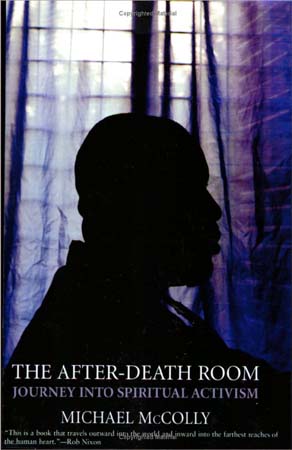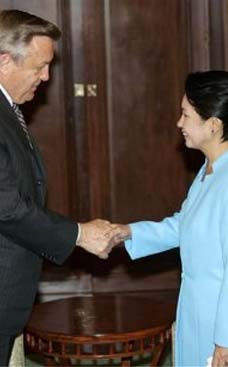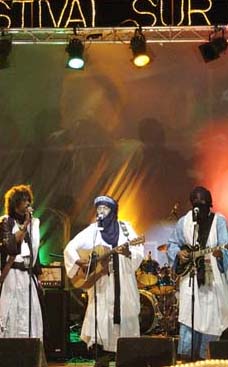
If AIDS had never come into this world, if it had never spilled into the blood of that first soul, I would have remembered that June of 1982 as the month that I fell in love with a half-Irish, half-Sicilian woman from Connecticut. But that month marks the beginning of another journey, one I would spend the next nineteen years refusing to take. I can still hear the voice coming from my short wave radio: Doctors in Los Angeles have reported a mysterious virus that has caused the death of several men who ... That morning was like any other in my life as a Peace Corps volunteer, living among the Wolof and Mandinka twenty miles from the Gambia River. I made my Nescafé. I wrote my letters. I ate my millet porridge with the village chief.
An excerpt from The After-Death Room: Journey Into Spiritual Activism by Senegal RPCV Michael McColly
Prologue
"To deny one's own experience is to put a lie into the lips of one's own life."
-- Oscar Wilde
The After-Death Room: Journey Into Spiritual Activism
If AIDS had never come into this world, if it had never spilled into the blood of that first soul, I would have remembered that June of 1982 as the month that I fell in love with a half-Irish, half-Sicilian woman from Connecticut. But that month marks the beginning of another journey, one I would spend the next nineteen years refusing to take.
I can still hear the voice coming from my short wave radio: Doctors in Los Angeles have reported a mysterious virus that has caused the death of several men who ... That morning was like any other in my life as a Peace Corps volunteer, living among the Wolof and Mandinka twenty miles from the Gambia River. I made my Nescafé. I wrote my letters. I ate my millet porridge with the village chief.
The rainy season had begun, and the farmers were in the fields planting peanuts, seed by seed, row by row, walking behind a plow and a pair of yoked oxen. Women clustered at the well, talking and telling stories, as hand over hand they pulled up water in black bags made of used tire tubing. Outside my hut children waited for the Koranic school to start, throwing stones at the baobab fruit hoping to knock down a treat. Over their excited voices, I listened to the man in London as if he were standing behind me in my little mud-brick hut: The virus, which doctors say destroys the immune system, has been detected in homosexual and bisexual men ...
I attempted to go about my work with the village women as we tried to grow tomatoes and carrots in the heat and the sand, but those words "mysterious virus" and "homosexual" and "death" fused with images I'd believed I'd erased from my memory when I'd crossed the Atlantic and joined the Peace Corps. Though I had no idea what this disease doctors were calling GRID (gay-related immune disease) would eventually mean for the world, I felt in those newscaster's words a terrible truth had been released upon me and the world.
I'd been caught, finally, at the far end of the world in a Muslim village of black Africans, the boy, the fugitive, who'd been running ever since that day that he'd reached out and touched the mirror image of himself in the trembling body of his friend in the barn behind his house.
Each time I heard the news repeated on my short-wave radio that day, images of my sexual history returned with increasing intensity and vividness: I saw myself as a boy take my mother's clothes out of the clothes hamper and slip them on before the bathroom mirror; I saw myself tiptoe through the darkness, kick off my pajamas and run naked, even in the snow, into the fields behind our house; I saw myself staring at the soapy torsos of my teammates in the showers in high school; I saw myself sucking on the tongues of black men in the blue light of video booths on Clark Street in Chicago. I'd hoped these episodes would one day be absolved by words, by love, by the body of a woman.
The finality of the announcer's voice kept ringing inside me, bringing me back, again and again, to these scenes, dredging up fragments of voices and emotions, until my memory settled on that summer day in my youth on a camping trip with my family in Maine, when my father overheard me confess "my secret" to my sister. The sorrow in the announcer's words had the same tone of truth I'd heard in my father in his speech on the "facts of life." Both men knew of the penalty men must serve for this "secret": sex would become loss -- an act that instead of connecting me to the world, would forever sever me from it.
That day in the woods in Maine, my father led me to a great pile of logs, slashed and sawed, and chaotically stacked to be dragged away. We sat on stumps and stared at the wood chips at our feet. I sobbed before he could open his mouth. Over and over I pleaded for him to stop: "I know, I know, I know ..." But my father dutifully carried on, explaining each biological stage, each effort at calming me having the opposite effect. No matter how softly spoken, each word fell like an axe on my innocence. In silence, we walked back in the sour piney heat of mid afternoon. Refusing his touch, I drifted further behind, wincing at each branch he snapped with his heavy shoes.
As a boy, I had learned in times of emotional chaos to take my body into the stillness of distance, outside and away from people and the things they made. One of my first memories as a child is riding a tricycle to the end of the subdivision where we lived. I was headed for the highway. And that is where neighbors stopped me and took me home. I think I was three. I have no memory of why I left or where I thought I might go. But I remember how good it felt to be pedaling, pedaling past all the houses, traveling further and further away.
So that day in Senegal when I heard the news, I knew I had to escape from the claustrophobia of my emotions and the reminder of my shame in every villager's face who came before me. And though it was midday and so bright you could almost see through your eyelids, I fled into the mirage of distance, desperate for the solace of the savannah. I hiked past the peanut fields and into the forest with its ancient baobab and ten-foot termite mounds. I found a wide-branched acacia and sat leaning against its trunk and watched dung beetles, like Sisyphus, roll ball after ball of goat shit in the sand.
Jokingly, the villagers nicknamed me "Tukkikat" -- one who loves to travel, or, as an old man once explained the Wolof word: "a man always on his way someplace else." To the Senegalese, isolating oneself was a sign of spiritual sickness, and so the women, worried by this trait of mine to steal away into the bush, would send their sons to watch over me. Sure enough, my spiritual bodyguards had followed me through the peanut fields. "Mustapha, what are you doing out here?"
A few days after I'd heard the radio report, I left the village to meet my colleagues in the city of Kaolack. There in the courtyard of the Peace Corps house, my American compatriots sat under the neem tree drinking beer and smoking the local ganja, recounting stories of the past week in their villages. On the table I could see the cover of that week's international Newsweek. A syringe dripped blood, with a headline that read: "AIDS: The New Hidden Killer."
Almost immediately the subject surfaced. When someone raised the question of how this new disease spread, my worldly, well-educated friends snickered, and I disappeared into the kitchen to get another beer, though I already had one in my hand. When I came back, I caught the eyes of Elizabeth. They were as wide open as they were that first night on the rooftop of the Kaolack house, stunned that I'd entered her, as we lay wrapped in a single sheet under the stars, our colleagues sleeping only feet away.
"Have you read the article?" she asked later that night in the cocoon of our mosquito netting. Brushing away her brunette hair so that I had to confront each olive eye, she pleaded with me to look at the article she had with her in our bed: "There's a guy in the article from Chicago, a man who has it -- he's in theater, too. Maybe you -- you, like know him?"
"I'll read it later," I mumbled, rolling away, afraid and drunk from drinking all day.
Two months before, when we first met, I told her that I'd slept with men. It was a relief to tell her, to tell someone what I'd never told anyone before. When I told her what it felt like to be with a man and why I did it, we both heard something more than a confession. We stayed up the whole night telling stories about family and childhood, about friends and lovers, our stories came gushing out, fears mixed with dreams mixed with desire. When the sun came up, I wanted to follow her into the bathroom; I didn't want to ever let her out of my sight.
I stared at the wall until she turned out the lights. I understood why she was concerned, but that tone in her voice terrified me: He lives in Chicago. He was in theater -- like you. When I was sure she was asleep, I got up, but she stopped me at the door: "Mike, where are you going?" "I'm going to smoke a cigarette. Is that okay?"
In the dark, I wandered into the main room in our Peace Corps house. This room had become a kind of shrine to those volunteers who'd come and gone since the late sixties. I turned on a light. There, under a torn poster of Che Guevara, lying on a bookshelf holding twenty years of paperback classics, I found the Newsweek. I picked it up, sank into a chair, lit a cigarette and never took a drag.
For a while I stared at the first page, not really reading but absorbing words and photos. I turned the last page of the article, and there he was: the guy from Chicago who had it -- John on his porch with his dog in Lincoln Park.
John was the stage manager at The Goodman Theatre where I had briefly worked as a stagehand on Tennessee Williams's last play. It was John who had invited me to meet the great playwright on opening night. I'd read every one of Williams's plays in high school, hearing in his characters a voice of sadness and longing that I believed only I possessed. That night, a drunken ghost in a fur coat scribbled Tennessee in an old paperback of Cat On A Hot Tin Roof. A few months later Williams was dead. He would be spared the horrors that would consume his friends and lovers in the years to follow.
In the photograph, John looked as I remembered him, confident, relaxed, smiling, but when I looked closer at the image, I noticed that his hand wasn't petting his dog; his hand was clutching the dog to his side.
I considered not going back to bed, knowing I would have to tell Elizabeth and arouse her fears of my bisexuality. But I had to tell her John was not a lover but only my boss. The next morning I did, but she kept asking questions as if I were lying to her about him and everything I'd told her about my past. Looking back, I don't blame her. She was scared, and so was I.
Lying in bed that night, I watched her as she slept, her breath lifting the sheet over her naked shoulder. I'd never been in love before, never known the comfort of waking up to someone sleeping next to me, never known the fear of love's loss. Looking at her body beside me, I became angrier and angrier knowing that under her sweetness and concern that she, too, now doubted me. It was her lack of doubt that I had clung to when we came together every other week from our posts.
However, desperate for the promise of love, Elizabeth and I continued our fairy-tale life for the next year, trying to teach African farmers twice our age things we didn't really know. I played the part in the romance we both wanted. I was the smiling, blond-haired hero doing good deeds to educate the backward Senegalese. I came to her village where we listened to the elders tell stories of the old times when they killed lions and fought Hitler and the Germans in North Africa with their weapons and sacred medicine.1 Then we retired to her hut and drank wine and made love on the dirt floor, biting our arms and shoulders to keep from being heard. Together we dreamed grand dreams. We would go home to get married, return with graduate degrees, and devote our lives to the Senegalese.
Toward the end of my second year, her parents and mine visited at the same time. I made the same grand speeches, professing my love and plans to stay a third year so that we could be together and continue our work. My parents, once so troubled when I'd gone to New York and Chicago to act, now looked at me as the man they'd hoped I'd become. The happy ending was a foregone conclusion.
After the dinner, Elizabeth and I snuck out of our parent's rooms in a seaside hotel to take a romantic swim. But I was too drunk to offer much affection, so I took off my clothes and jumped in to sober up. I swam as hard as I could and then stopped. I could hear her calling my name, but the salty water felt so good on my body that I swam further and further until the lights of the hotel became a blur.
When I came back, she stood hands on hips, up to her knees in the surf: "Why did you do that? Why did you scare me? Why tonight?"
I had no answer to that question or why the next month I changed my mind and decided to go home after all. I thought I was losing my mind and so did everyone else, my colleagues and the villagers, who were already planning projects with me for the next year. Elizabeth was heartbroken and humiliated. I tried to explain, pleading with her to come back with me and get on with our lives and leave this playacting of the Peace Corps. She'd been sick for months with hepatitis and dysentery. I begged her to return with me for her own health. But my about-face had confirmed her doubts. Then she got a letter from her sister in San Francisco. I saw it lying on the bed with my name sprinkled throughout, so I read it: "I know what these guys are like. You will never be able to satisfy him. Drop him before it's too late!"
My flight was in the middle of the night, so Elizabeth and I went out to eat and I drank as much as I could possibly get down. Back at our cheap hotel, we undressed and lay on a thin mattress supported by a slab of cement. A single light bulb dangled over our naked bodies. Wolof sex workers cackled in the hallway. Mosquitoes bore into the backs of our thighs. She turned her head away and cried.
At the airport, when my flight was announced, I got sick, ruining the shirt she'd given me as a going-away gift. With my romantic dreams and big plans stuffed into a duffle bag, I staggered up the steps of the plane, leaving behind the hopes of two villages and Elizabeth, who stood there on the tarmac, holding a shirt stained with cheap wine and vomit.



















